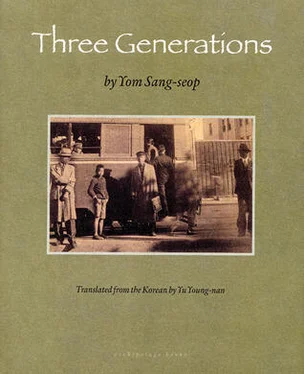No sooner had the maid left than the old man appeared. He was not especially eager to see his daughter-in-law, but he had nothing much to do during the day, so he spent his time wandering between the inner and outer quarters. Impatient by nature, he came over as soon as he heard his daughter-in-law had arrived.
When he cleared his throat at the gate leading to the inner quarters, his daughter-in-law came out of Deok-gi’s room.
“Hmmm,” he grunted as he glanced at her. When he caught sight of Deok-gi, who was still in his pajamas, washing his face on the edge of the veranda, he began to scold him. “Do you plan to wear those all day long?” Then he got really angry. “Where did you go yesterday, and when did you get home?” He already knew what time Deok-gi had come in because his wife had told him. Deok-gi had no choice but to stand quietly, eyes averted, face dripping wet.
The old man entered the main room. His daughter-in-law followed and offered a deep bow. Only then did she come face-to-face with her stepmother-in-law.
“You’re all right, then?” The old man rarely ventured out of his house, and his daughter-in-law was reluctant to visit him unless she had to. She paid her respects on an average of once a month.
“Will you stay until the memorial, the day after tomorrow?” the father-in-law asked her, all of a sudden.
She stood for a moment without answering. Then she remembered that the memorial rite for the old man’s father was to be held in two days.
“If you don’t have anything important to do, why don’t you just stay here instead of traveling back and forth? We can’t leave all the work to the young ones.”
The daughter-in-law couldn’t bring herself to say yes, and her father-in-law was offended.
“Of course, you should be the one to help prepare it,” his wife broke in from the corner, where she was sitting with her face turned away. “What can I do when the days are so short and I have a baby?” She was disturbed by the old man’s comment, which sounded almost as if he were insulting her in front of his daughter-in-law.
Deok-gi’s mother remained as silent as if she’d been caught swallowing a mouthful of stolen honey. She didn’t appreciate her stepmother-in-law using the form of speech reserved for addressing younger people. She was tempted to respond in kind, but she knew it would accomplish nothing in the end, which made her furious.
Granted, she’s just a second wife, but if she had some manners and proper upbringing, there would be no reason she couldn’t take charge of the rite. After all, it isn’t as special as the first or second anniversary of the dead. And why this excuse about the baby? Does she really think that a woman raising children can’t make time for anything else?
“I know you people don’t care about ancestral rites since you’ve become involved in Christianity and whatnot,” the old man said. “But there’s nothing you can do about it while I’m still alive!”
He looked with disapproval at his daughter-in-law standing there mute. Though he tried to repress a surge of anger, his wrinkled face colored as he remembered the annual conflict with his son over the ancestral rites. The daughter-in-law was frightened, but she didn’t feel free to speak.
“So now you’ve gone and become a Catholic yourself? Will you offer me even a drop of ceremonial water after I die?” His voice grew louder.
The Suwon woman — the stepmother-in-law was from Suwon — was quite pleased with the old man’s scolding tone. She thought it would be amusing if his daughter-in-law answered back.
And she did at last. “I came here fully intending to help with the preparations, sir. I was going to see my son off and then return home after the ancestral rite.”
Faced with this unexpectedly docile reply, the old man felt somewhat deflated and was no longer angry. But his wife felt cheated, as if she had chased a fire truck hoping to see a full blaze only to return home after settling for just a few wisps of smoke.
The old man began his usual sermon. “Even if you believe in Christianity, or something more important than that, there’s nothing wrong with holding memorial rites for your parents. They say Jesus didn’t know who his father was, but he was born thanks to his parents, wasn’t he? Deok-gi, you listen carefully!” he shouted toward the veranda. He went on grumbling about Christianity, then moved to the topic of his son.
“Deok-gi!” he called to his grandson, who was drying his face with a towel in his room.
“Yes, sir,” Deok-gi answered, entering the main room.
“Take that Japanese robe off, will you? You should be more careful about what you wear.” He broke off his scolding with a strict order: “Leave after the rite!”
“Yes, sir.” Deok-gi was exhausted. He was also upset that he could do nothing for Gyeong-ae, so this command was, in fact, a relief. He knew he shouldn’t feel disturbed by Gyeong-ae’s circumstances, and it was certainly no reason to put off his departure, but he welcomed the delay nonetheless.
On the other hand, staying meant hearing his grandfather disparage his father, which Deok-gi hated. He never took sides, but his grandfather’s all-too-frequent sermons on Christianity gave him a headache. He had heard it so often since childhood that if his grandfather’s words were nails, his ears would be stuffed with them. Several times a year, when it was time to observe the ancestral rites, it got even worse.
During the memorial for Deok-gi’s grandmother, the whole house was turned upside down. Deok-gi’s father never attended his mother’s rite, which was hosted by the old man and attended by Deok-gi, his mother, and numerous cousins.
“The bastard doesn’t even respect his own mother!” the old man would spit out a hundred times a day, as he trotted back and forth between the inner and outer quarters, calming down only on the night after all the guests left.
“The master and his wife got along so well,” the young women would say within earshot of the Suwon woman. Deok-gi’s mother would join in by mocking her husband: “It ’s no wonder they did — just look at the frightfully gentle and wise son they gave birth to.”
The Suwon woman would retreat to her room to sulk and then lash out at the children. The women didn’t approve of her behavior, so they giggled and made a racket while preparing the feast. All night long, they would make disrespectful remarks just loud enough for her to hear — that the old gentleman paid far more attention to his first wife’s rite than to that of his own father, that a woman could wish for nothing more if she knew her husband would prepare such a ceremony for her after her death, that the first wife’s spirit would visit the main room to spend a restful night there.
This time, listening to his grandfather rattle on about how everyone lacked the proper devotion for the rite, Deok-gi could only think, Should I go to Bacchus again tonight? His head throbbed. He gazed blankly at his grandfather’s eyes, flaring behind his glasses, as if he were staring at the horizon.
The tirade concluded with the warning that Deok-gi shouldn’t party all night with the likes of that good-for-nothing who had come the day before. Deok-gi and his mother were dismissed, and they returned to his room.
Deok-gi sat before the meal that his wife had brought in on a tray. As he watched his mother, who positioned herself silently next to the portable brazier with a cigarette between her lips, he thought about Gyeong-ae.
Does Mother know about her? What really happened? Why did Father and Gyeong-ae split up? I heard there was a child, my half-sister. I’ve never seen her, nor do I want to.
Deok-gi felt as if his tongue had dissolved into little pieces and an earthquake had erupted in his head. He busied himself with his rice, which he had dumped into a bowl of water. He could think of only one thing: Should I ask Mother about it?
Читать дальше












